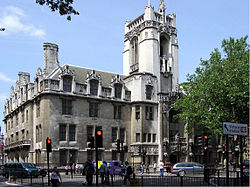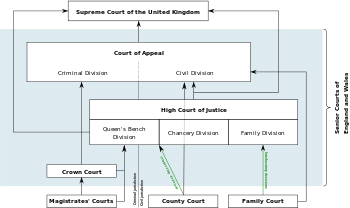Courts of England and Wales
There are additional exceptions to this rule; for example, in immigration law, the Asylum and Immigration Tribunal's jurisdiction covers the whole of the United Kingdom, while in employment law, there is a single system of employment tribunals for England, Wales, and Scotland but not Northern Ireland.There have been multiple calls from both Welsh academics and politicians for a Wales criminal justice system.Before the Constitutional Reform Act 2005 this role was held by the Appellate Committee of the House of Lords.[25] The judicial expertise available in the Rolls Building includes asset recovery, banking, commodities, company law, construction, finance, fraud, insolvency and reconstruction.It also covers information technology, insurance, intellectual property (including patents), international trade, mining, oil and gas, partnership, property, public procurement, regulation, shipping, tax and trusts.A County Court hearing is presided over by either a district or circuit judge and, except in a small minority of cases such as civil actions against the police, the judge sits alone as a trier of fact and law without assistance from a jury.Youth courts are presided over by a specially trained subset of experienced adult magistrates or a district judge.Youth courts are not open to the public for observation, only the parties involved in a case being admitted.Examples of specialist courts are: The post of coroner is ancient, dating from the 11th century, and coroners still sit today to determine the cause of death in situations where people have died in potentially suspicious circumstances, abroad, or in the care of central authority.Since the 19th century, the jurisdiction of the ecclesiastical courts has narrowed principally to matters of church property and errant clergy.Military courts of the United Kingdom include There are two kinds of criminal trials: "summary" and "on indictment".Despite the possibility of two venues for trial, almost all criminal cases, however serious, commence in a magistrates' courts.If the magistrates consider that an either way offence is too serious for them to deal with, they may "decline jurisdiction" which means that the defendant will have to appear in the Crown Court.Conversely, even if the magistrates accept jurisdiction, an adult defendant has a right to compel a jury trial.Alternatively, a case may be heard by a district judge (formerly known as a stipendiary magistrate), who will be a qualified lawyer and will sit singly, but has the same powers as a lay bench.District judges usually sit in the more busy courts in cities or hear complex cases (e.g. extradition).For personal injury, defamation cases, and in some landlord and tenant disputes, the thresholds for each track have different values.Part II of Schedule 4 to the Administration of Justice Act 1977 curtailed the jurisdiction of certain other anomalous local courts.


Judiciary of England and WalesCourt of St James'sHis Majesty's Courts and Tribunals Servicecriminalcourtsadministration of justiceEngland and WalesSupreme Court of the United KingdomScotlandNorthern Irelandimmigration lawAsylum and Immigration Tribunalemployment lawemployment tribunalsMilitary Court Service offences against military lawCourt of AppealHigh CourtCrown CourtCounty Courtmagistrates' courtsMinistry of JusticeWales criminal justice systemMiddlesex GuildhallJudicial Committee of the Privy CouncilConstitutional Reform Act 2005Appellate Committee of the House of LordsdevolutionPresident of the Supreme Court of the United KingdomProposed Welsh justice systemHigh Court of JusticeHM Courts and Tribunals ServiceCourt of Appeal (England and Wales)appeals from the Crown CourtSupreme Courtcourt of first instanceappellate courtRolls BuildingCommercial CourtOxfordCourts Act 1971assizesquarter sessionscounty boroughsThe Old BaileyindictmentFamily CourtYouth courtsCounty Court (England and Wales)Family Justice System of England and Walesfamily proceedings courtsjustices of the peacelocal justice areajuriesCrime and Courts Act 2013family proceedings courtTribunals in the United KingdomList of tribunals in the United Kingdomemployment tribunalcontempt of courtEmployment Appeal TribunalFirst-tier TribunalUpper TribunalTribunals, Courts and Enforcement Act 2007coronertreasure troveChurch of Englanddefamationecclesiastical courtsbarristersolicitorconsistory courtbishopArches CourtChancery CourtCourt of Ecclesiastical Causes ReservedMilitary courts of the United KingdomCourt Martial Appeal CourtElection courtBarmote courtHigh Court of ChivalryheraldryVerderers' courtsNew ForestForest of DeanEpping Forestindictable offenceyouth courtcircuit judgeAdministrative Courtcase statedjudicial reviewCivil Procedure Rules 1998History of the courts of England and WalesNorman ConquestFrenchCourt of King's BenchCourt of ChanceryExchequerAdmiraltyCourt of Common PleasProbateMatrimonial CausesCourt of Common Pleas of the County Palatine of LancasterCourt of Pleas of the County Palatine of Durham and SadbergeCourt of Appeal in ChanceryHouse of LordsStar ChamberCourt of High CommissionCourt of Criminal AppealCourt for Crown Cases ReservedCourts of piepowdersAssize CourtRestrictive Practices CourtCourts leetCounty Palatine of ChesterPrincipality of WalesLaw Terms Act 1830Court of the County of DurhamDurham (County Palatine) Act 1836Stannaries CourtDr. BeechingCourt of Chancery of the County Palatine of LancasterCourt of Chancery of the County Palatine of Durham and SadbergeMayor's and City of London CourtTolzey